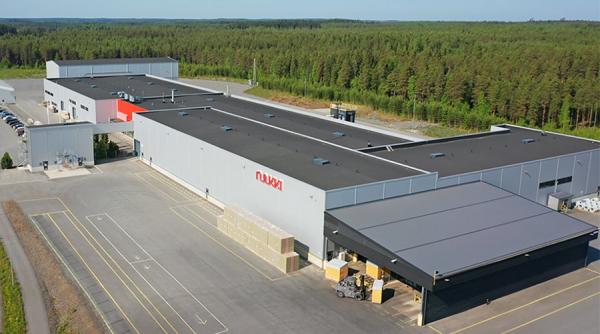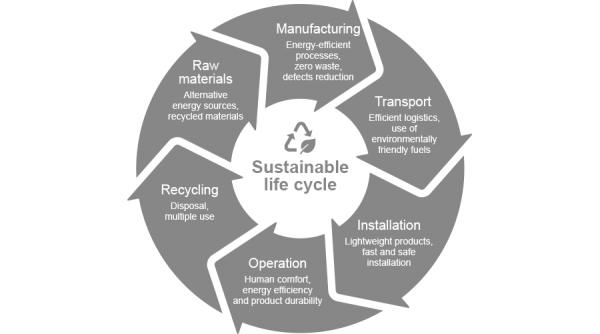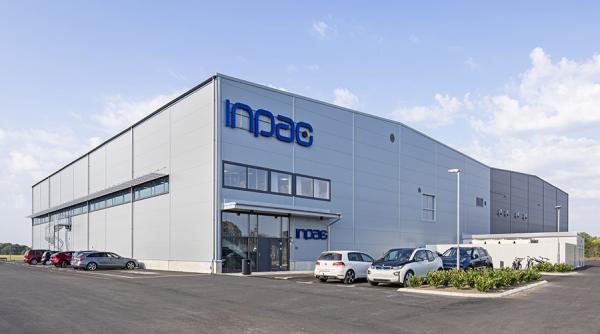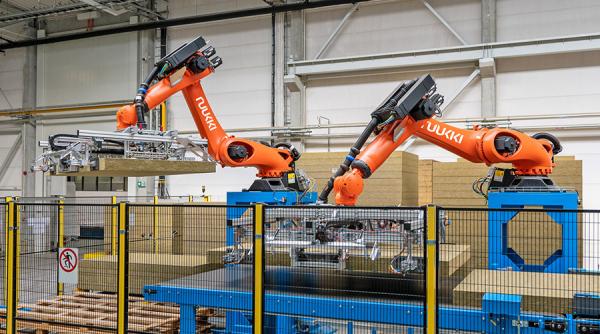The European Union’s goal is to reduce greenhouse gas emissions by at least 55% by 2030 and become a climate-neutral region by 2050. In this context, the Energy Performance of Buildings Directive (EPBD) requires:
For existing buildings:
- Reduce primary energy consumption of residential buildings by 16% by 2030 and by 20-22% by 2035
- Focus on the least energy-efficient buildings modernization
- Replace fossil fuel heating and air conditioning with alternative solutions by 2040
- Install solar power panels where it is possible starting from 2027
For new construction:
- Achieve net-zero emissions on construction sites starting from 2028 for public buildings and from 2030 for other buildings
- Projects must be adapted for the installation of photovoltaic or solar thermal systems
In a European context, the Finnish company Ruukki is a good example for other manufacturers and is well ahead in implementing green solutions. By the end of 2023, the company has already achieved a 59% reduction in CO2 emissions from its operations compared to 2019, when annual carbon emissions were 12,000 tons.

To reduce CO2 emissions from 2019 to 2023, Ruukki has implemented the following solutions:
- Most of the company’s plants have started to be supplied with electricity that is obtained without fossil fuels
- Partial transition to electric forklifts and biodiesel transport for internal needs
- Switching heating to low-carbon energy sources
- Switching to LED lighting
- Minimizing heat losses
Starting from 2024, the following solutions are gradually being implemented at Ruukki production sites:
- Full transition of all plants to electricity that is obtained without fossil fuels
- Full transition to electric forklifts and biodiesel transport for internal needs
- Replacement of heating and air conditioning systems and energy sources with the newest alternatives
- Reduction of energy consumption at all stages of production
Ruukki strives to have a positive impact on the environment and society through innovative solutions, focusing on four key areas:
1. Climate change. The company is responsible for climate change and works to reduce the impact of its operations on the environment. Ruukki products are durable and help reduce the carbon footprint of a building due to their low global warming potential (GWP) and improved energy efficiency.
2. Circularity. Ruukki uses high-quality steel and coatings that guarantee a long service lifetime and minimal maintenance of products. The company is increasing the recycled content of its products, which is already around 20%. The core of the Life series sandwich panels consists of 70% recycled glass, and the PIR core contains raw materials that consist of 50% recycled PET. Ruukki’s products are fully recyclable.
3. Biodiversity. Ruukki supports a biodiversity approach in its operations. The company minimizes the use of plastic in packaging. Green roof solutions not only improve urban landscapes, but also provide a habitat for diverse flora and fauna, contributing to a healthy ecosystem.
4. Safety and well-being. Ruukki products are designed for safe installation and use.

Starting in 2023, Ruukki will use fossil-free steel for the production of sandwich panels, facades cladding and roofing materials, in the production of which hydrogen, electricity and biogas are used instead of fossil fuels. The byproduct of this production process is not carbon dioxide, but water. At the end of 2023, the world’s first building with sandwich panels made of fossil-free steel was built in Sweden, and the world’s first roof made of such steel was completed in Finland.

The world\’s first building with sandwich panels made of fossil-free steel

The world’s first building with roof made of fossil-free steel
Ruukki fosil-free steel products will be widely available on the market from 2026, which will significantly reduce carbon dioxide emissions in the construction sector.
Today Ruukki offers sustainable solutions that improve the energy efficiency of buildings and help them achieve higher LEED and BREEAM certification scores:
- Solar panels for industrial roofs
- Airtight technology for building envelopes
- Sound Environment acoustic structures
- Life series sandwich panels with a high content of recycled materials

All Ruukki products have Environmental Product Declarations, which describe their environmental impact throughout their entire life cycle, from raw material supply to disposal.
Ruukki fossil-free steel products will become widely available in Ukraine from 2026, and their use will enable Ukrainian companies to reduce carbon emissions and improve the environmental impact of their business.
In Ukraine, European brand roofing materials for private cottages are produced by Ruukki Ukraine, and the exclusive supplier of Ruukki products for commercial construction is Rauta.
